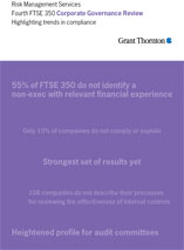Do professional firms need non-executive directors? How relevant is board governance to a firm?
10 January 2014 By Northern Lights

Calum Lynch, is responsible for Grant Thornton’s Business Risk Services team outside of London. He recently spoke at the Leeds Managing Partners’ Forum, discussing risk management in professional services firms. This blog picks out some of the discussion areas from that presentation.
Should your firm have an independent non-executive director?
That was the question that kicked off the session for the Managing Partners’ Forum in Leeds the other day. I think it is fair to say that the prevalence (or lack) of Non-Execs in professional services suggests that few of those present were openly committed to the level of value they could bring.
Firms live or die by reputations. Understanding yours and how it plays with your position in the market is critical. How many times could you point to a competitor talking about insight, skills and experience, yet undercutting you on fees drastically. You are switched on enough to know that the two don’t tally – and likewise others look at your firm and make judgements on your reputation. When it goes wrong, the results can be dramatic.
Back when I was doing my training contract I was pleased to be part of a “Big 5”. Each firm assured of its own position and reputation. Each with its own character and confident that its approach was right. None more so than Arthur Anderson – and no one needs reminding of how brutal and swift that fall from grace was. But it’s easy to forget that their reaction to a risk event (admittedly of their own making) compounded the damage. Not only did they not manage the risk, but the decisions taken in the aftermath… well you get the picture.
In an increasingly transparent and volatile world a new role of risk manager has been created at some firms. But why should this be any different to the passive compliance-driven approach of the past? Do colour coded spread sheets and PowerPoint heat maps really change behaviours – is your firm actually looking at managing risk or is it setting up a risk management process. The two things are not necessarily the same.
Meanwhile, my MPF colleagues tell me the tough choices facing firms have resulted in the creation of formal boards, tasked to own the strategy and hold the management team to account for its execution.
There are three key areas when looking at for firms
- Governance in a Partnership
- Risk and proportionate risk management
- Where does your assurance come from, and how do you use it?
1. Governance for professional firms
The IoD outlines what corporate governance is
“Corporate governance is the structure through which an organisation is directed, controlled and held accountable. It defines a framework of rights, responsibilities, procedures and relationships amongst the various stakeholders of an organisation, including its directors, managers, shareholders and regulators. The board of directors – or equivalent governing body – is at the heart of any framework of corporate governance, and is arguably the most important mechanism for ensuring that the organisation makes effective decisions which are consistent with its ultimate objectives and mission.”
Annually Grant Thornton publishes the Corporate Governance Review. Focused on the FTSE 350 we see large numbers of organisations who are not fully compliant. The temptation is to ask ‘if “Comply or Explain” is good enough for them, then why should we have to do it?’ Simply ask yourself – what if your firm’s governance is lacking? What if you don’t have the right decision-making processes? What if we don’t know where decisions should be made, or understand the context in which they are?
Most firms have financial delegation, but are they made strategically and to meet the business goals? The IOD publishes guidance for unlisted entities, which sets out four elements to good decision-making
- Ensuring accountability and effective scrutiny
- Setting strategic aims and goals
- Monitoring and measuring performance
- Appointing and ensuring the effectiveness of the head of institution/CEO
A good board with effective decision-making will ensure that tasks are delegated within the business but without delegating responsibility.
Many see the likes of Sir Alan Sugar, Steve Jobs and Sir Richard Branson as the antithesis of “Corporate Governance” structures. Real leaders who won’t be constrained by rules. Whilst its hard to argue with their success (unless you happen to be on twitter and you get in Sugar’s way, in which case its actually pretty easy to argue with him!) this perception is fatally flawed. Having read their autobiographies all three are clear in the need to “downside” opportunities. Look at what could derail a project and think through how it can be prevented.
Almost like they are managing something…. isn’t this risk management in practice? It may lack the formality we all expect – but when you are a money-making machine I guess you are given some flexibility!
For the rest of us mere mortals, we work within a firm structure. We need, says the IOD, to ensure longevity beyond specific individuals; confidence and commitment amongst backers; the firm aims to be good corporate citizens; and to generate financial benefit.
1. Proportionate risk management
Some professional firms are sceptical about formal boards and corporate governance. Talking about risk management or governance structures has a tendency to bring out the chest-beating primate in some – “Why should I?” Adopting the stereotypical throaty northern accent such proclamations require, “I just bloody well get on and do it”. Being the unashamed risk geek that I am, it may surprise you that I’m not going to try and convince you of the benefit of all of this. I will simply say that if you don’t know or accept the risks you face, if you are neither honest nor aware of the exposures you have and if you’re not willing to consider how to address matters that could go wrong… then I know some very good recovery partners and I’d be happy to pass on their details.
For those that are honest and intelligent enough to face up to the reality that everything that is worth doing involves taking some risk, then I’d simply point out that knowingly taking risk is an essential part of running an effective business – assessing risk at a senior level is key. Be open about considering “gross” risk, be honest in assessing “net” risk. Then look at how risk is driving actions and ensure that there are realistic responses, which are challenged regularly.
2. Assurance
Assurance is trust, with validation. One definition is
“Provision of information from a variety of sources which confirms the position, in relation to risks, as presented to the Board is current and accurate.”
The point here is that assurance comes from a variety of sources. And if you only rely on your internal management team for challenge and assurance, you are at risk of ‘group think’ and miss spotting threats – and opportunities. Think Phil Neal and Graham Taylor (click on the video below…)
One of the issues we discussed at the Leeds session was whether most executive teams really understand social media – and if not, how are they managing those risks? Consider this, over the last two years I have come across various organisations who still think social media is an IT and HR issue.
This is just one example where having differing views, knowledge and experience can really bring added value. They will help your business to think differently – and better.
The professional market is currently going through considerable change and self-analysis. A previous MPF session looked at whether there are too many law firms and the impact on mergers and downsizing. Again, having a robust board with independent thinking can help on these decisions.
So, should a professional firm have an independent non-executive director – and do they add value? Have you experiences to share, good and bad?

